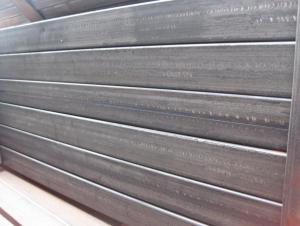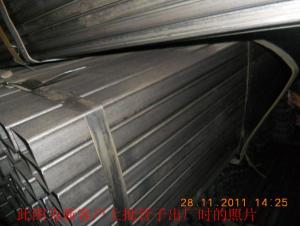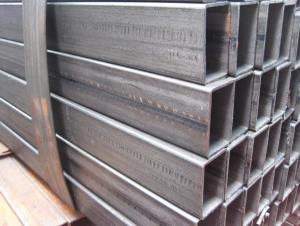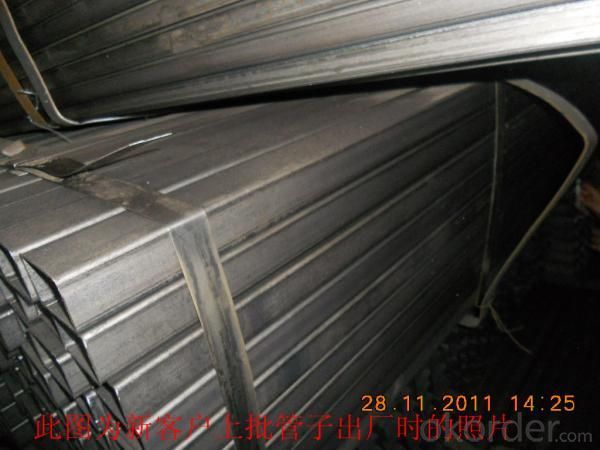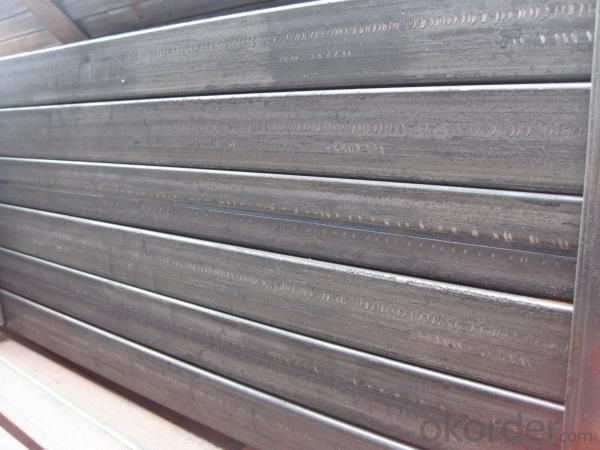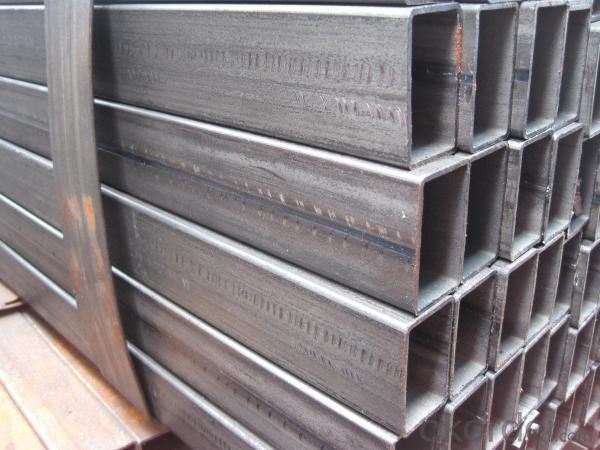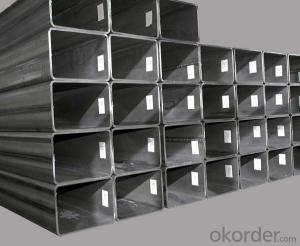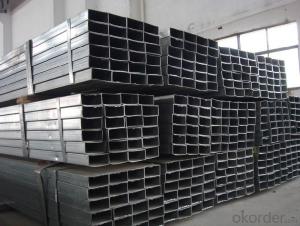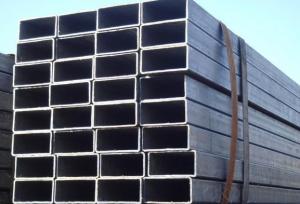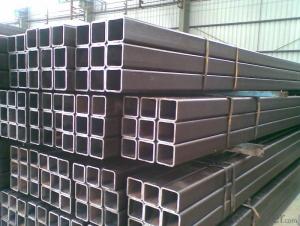Hollow Section-Rectangle Tubes
- Loading Port:
- Tianjin
- Payment Terms:
- TT or L/C
- Min Order Qty:
- 50MT m.t.
- Supply Capability:
- based on order m.t./month
OKorder Service Pledge
OKorder Financial Service
You Might Also Like
Application
It is widely used in building, machine, chemical equipment, automobile industrial, container, it is also applied to agriculture and mine machine.
Standard:
ASTM A500, GB6728
Steel grade:
ASTM A500: A, B, C
GB6728:Q195,Q215,Q235,Q345
Size of Pipe:
*Remark: Besides below sizes, we also can arrange production based on requirement of customers
Sizee(mm) | Thickness(mm) |
20×10 | 0.6-1.0 |
25×12 | 0.6-1.0 |
38×19 | 0.6-1.5 |
50×25 | 0.6-1.5 |
50×30 | 1.6-3.0 |
60×40 | 1.5-3.5 |
75×50 | 1.5-4.0 |
80×40 | 1.5-4.0 |
100×50 | 2.0-6.0 |
100×60 | 2.0-6.0 |
100×75 | 2.0-6.0 |
120×60 | 3.0-6.0 |
120×80 | 3.0-6.0 |
125×50 | 3.0-6.0 |
125×75 | 3.0-6.0 |
150×50 | 3.0-6.0 |
150×75 | 3.0-6.0 |
150×100 | 4.0-12 |
160×80 | 4.0-6.0 |
175×100 | 4.0-12 |
200×100 | 4.0-12 |
200×150 | 4.0-12 |
250×150 | 5.0-12 |
300×200 | 5.0-12 |
400×200 | 5.0-12 |
Standard: ASTM A500
Chemical Composition(%)
Chemical Requirement | ||||
| Composition % | |||
Grade A | Grade B | |||
Heat | Product | Heat | Product | |
Element | analysis | analysis | analysis | analysis |
Carbon max | 0.26 | 0.3 | 0.22 | 0.26 |
Manganese max | … | … | 1.4 | 1.45 |
Phosphorus, max | 0.035 | 0.045 | 0.03 | 0.04 |
Sulfur max | 0.035 | 0.045 | 0.02 | 0.03 |
Where an ellipsis (...)appears in this table, there is no requirement | ||||
For each reduction of 0.01 percentage point below the specified maximum for carton, and increase of 0.06 percentage point above the specified maximum for manganese is permitted, up to a maximum of 1.50% by heat analysis and 1.6% by product analysis | ||||
Mechanical Properties
Tensile Requirement | ||
| Grade A | Grade B |
Tensile strength, min, psi (Mpa) | 48000 (400) | 70000 (483) |
Yield strength, min, psi (Mpa) | 36000 (250) | 50000 (345) |
Elongation in 2 in. (50.8mm), min, % | 23 | 23 |
GB6728:
Steel Grade |
CHEMICAL COMPOSITION |
MECHANICAL PROPERTIES | ||||||
|
C (%) |
Si (%) |
Mn
(%) |
P(%)
Max |
S (%)
Max |
YS(Mpa)
Min |
TS(Mpa)
Min |
El (%)
Min |
Q195 |
0.06-0.012 |
0.3 |
0.25-0.5 |
0.45 |
0.5 |
195 |
315 |
22 |
Q215 |
0.09-0.15 |
0.3 |
0.25-0.55 |
0.45 |
0.5 |
215 |
335 |
22 |
Q235 |
0.12-0.22 |
0.3 |
0.3-0.7 |
0.45 |
0.45 |
235 |
375 |
20 |
Q345 |
0.20 |
0.55 |
1.0-1.6 |
0.45 |
0.45 |
345 |
510 |
21 |
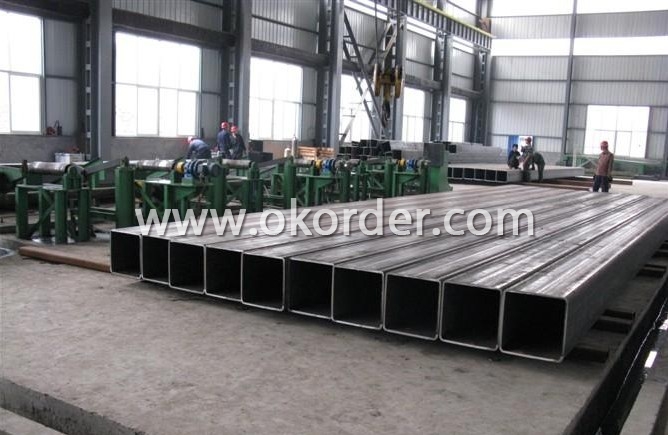
Chinese Hollow Section-Rectangle Tubes/Hiquality Hollow Section-Rectangle Tubes
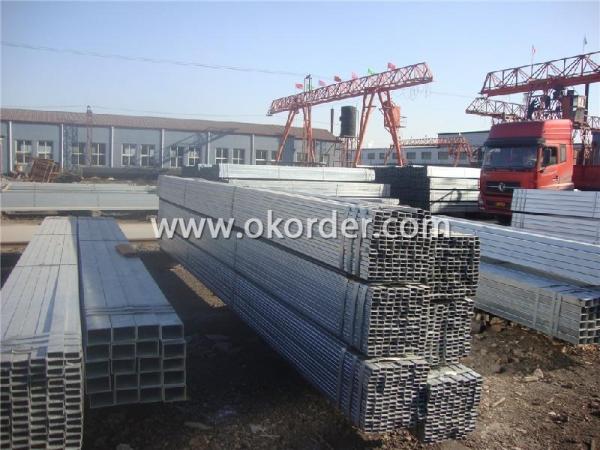
manufacturer of Section-Rectangle Tubes
- Q: Can steel pipes be used for oil and gas well production?
- Yes, steel pipes can be used for oil and gas well production. Steel pipes are commonly used in the oil and gas industry due to their strength, durability, and resistance to corrosion. They are able to withstand high pressure and extreme temperatures, making them suitable for transporting and extracting oil and gas from wells.
- Q: What is the primary purpose of steel pipes?
- The primary purpose of steel pipes is to transport fluids and gases, such as water, oil, and natural gas, over long distances efficiently and safely. They are commonly used in various industries including construction, oil and gas, and infrastructure development.
- Q: What are the different types of steel pipe connections for oil and gas pipelines?
- There are several types of steel pipe connections used for oil and gas pipelines, including threaded connections, welded connections, flanged connections, and grooved connections. Threaded connections involve screwing two pipe ends together using threads, providing a secure and leak-proof joint. Welded connections involve fusing pipe ends together using heat, creating a strong and durable joint. Flanged connections use a flange on each pipe end that is bolted together, providing a sturdy and easily removable joint. Grooved connections involve utilizing a groove on each pipe end, which is then locked together using a coupling, ensuring a reliable and flexible joint.
- Q: How are steel pipes used in the oil and gas pipeline transportation?
- Due to their durability, strength, and resistance to corrosion, steel pipes find extensive use in the oil and gas industry for pipeline transportation. Specifically designed to withstand high pressure and transport various fluids, including crude oil, natural gas, and refined petroleum products, these pipes serve three main purposes in the industry: gathering, transmission, and distribution. Gathering pipelines collect oil and gas from production wells and transport them to processing facilities. Steel pipes are chosen for their ability to endure harsh conditions at extraction sites and effectively transport fluids across long distances. Transmission pipelines, on the other hand, transport oil and gas across vast distances, even spanning countries or continents. Steel pipes are perfect for this task, excelling in handling high pressure and ensuring the efficient flow of fluids over extended distances. To safeguard against external elements and minimize damage risks, these pipes are often buried underground or submerged in water. Distribution pipelines deliver oil and gas to end-users, such as homes, businesses, and industrial facilities. Steel pipes are frequently employed in these pipelines due to their capability to handle varying demand and pressure requirements of different consumers. Though smaller in diameter compared to transmission pipelines, they still provide reliable and safe transportation of oil and gas to their final destinations. Besides their strength and durability, steel pipes used in oil and gas pipeline transportation are coated or lined with different materials to enhance corrosion resistance and reduce the risk of leaks. These protective coatings and linings ensure the pipes' longevity and preserve the integrity of the transported fluids. In summary, steel pipes play a vital role in the oil and gas industry by providing a dependable and efficient means of transporting oil and gas from production sites to processing facilities and ultimately to end-users. Their durability, strength, and resistance to corrosion make them an ideal choice for pipeline transportation in this industry.
- Q: How are steel pipes used in the telecommunications sector?
- Steel pipes are commonly used in the telecommunications sector for underground cable management and protection. These pipes provide a durable and secure conduit for telecommunication cables, ensuring their safety from external factors such as weather, vandalism, and accidental damage. Steel pipes also offer excellent strength and resistance to corrosion, making them ideal for long-term use in telecommunications infrastructure.
- Q: How do you calculate the pipe buoyancy for steel pipes in water?
- In order to determine the buoyancy of steel pipes in water, one must take into account the weight of the water displaced by the submerged part of the pipe. This can be achieved by applying Archimedes' principle, which states that the buoyant force on an object submerged in a fluid is equal to the weight of the fluid displaced by the object. Firstly, the volume of the submerged portion of the pipe needs to be calculated. This can be accomplished by multiplying the cross-sectional area of the pipe by the length of the submerged part. Next, the density of the water surrounding the pipe must be determined. Typically, this value is approximately 1000 kg/m³ for freshwater and slightly higher for seawater. To find the weight of the water displaced, multiply the volume of the submerged portion of the pipe by the density of the water. Lastly, compare the weight of the water displaced to the weight of the steel pipe. If the weight of the water displaced is greater than that of the pipe, the pipe will exhibit buoyancy and tend to float. Conversely, if the weight of the pipe is greater, it will sink. It is worth noting that factors such as pipe design, wall thickness, and external forces acting upon the pipe may also impact its buoyancy. Therefore, it is advisable to consult industry-specific guidelines or seek professional advice for precise calculations in specific scenarios.
- Q: Can steel pipes be used in marine environments?
- Yes, steel pipes can be used in marine environments. Steel is a commonly used material in marine structures due to its strength, durability, and resistance to corrosion. However, it is important to use the appropriate grade of steel and apply protective coatings to enhance its resistance to seawater corrosion. Regular maintenance and inspections are also necessary to ensure the longevity and performance of steel pipes in marine environments.
- Q: What are the uses of seamless steel tubes?
- Compared withsteel and roundsteelinsolid, flexural torsional strength in the same time, the weight is light, is a kind of economic section steel, widely used in the manufacture of structural parts and mechanical parts, such as the oil pipe, automobile transmission shaft, the bicycle frame and steel construction with scaffold with steel pipe manufacturing ring parts can be improved the utilization rate of materials, simplify the manufacturing process, material saving and working hours, such as rolling bearing ring, Jack and so on, has been widely used in steel pipe manufacturing.
- Q: How are steel pipes used in the construction of airports?
- Steel pipes are used in the construction of airports for various purposes such as drainage systems, fuel pipelines, water supply networks, and structural support for buildings and runways.
- Q: What are the different methods of pipe joining using steel pipes?
- There are several methods of pipe joining using steel pipes, each with its own advantages and disadvantages. 1. Threaded and coupled: This method involves threading the ends of the steel pipes and using couplings to connect them. It is a simple and cost-effective method, but it is not suitable for high-pressure or gas applications. 2. Welding: Welding is a popular method for joining steel pipes. It involves heating the ends of the pipes and fusing them together using a welding process. This method creates a strong and leak-proof joint, but it requires skilled labor and can be time-consuming. 3. Grooved: In this method, the ends of the steel pipes are grooved and then connected using mechanical couplings or fittings. It is a quick and reliable method, suitable for both high-pressure and low-pressure applications. However, it requires specialized tools and equipment. 4. Flanged: Flanged joints involve connecting steel pipes using flanges, which are flat discs with bolt holes. The pipes are aligned and bolted together using gaskets to create a secure connection. This method is commonly used for large-diameter pipes and high-pressure applications, but it can be expensive and time-consuming to install. 5. Compression: Compression fittings are used to join steel pipes by compressing a ferrule or sleeve against the pipe. This method is quick, easy, and requires no special tools. However, it is not suitable for high-pressure or high-temperature applications. 6. Brazing: Brazing involves heating the ends of the steel pipes and melting a filler material between them to form a joint. It is a reliable method for joining pipes in HVAC and refrigeration systems, but it requires skilled labor and careful temperature control. It is important to consider the specific requirements of the application, such as pressure, temperature, and material compatibility, when selecting the appropriate method of pipe joining using steel pipes.
1. Manufacturer Overview
| Location | Tianjin,China |
| Year Established | 2000 |
| Annual Output Value | Above Thirty Million RMB |
| Main Markets | China; Europe |
| Company Certifications | ISO9001:2000 |
2. Manufacturer Certificates
| a) Certification Name | |
| Range | |
| Reference | |
| Validity Period |
3. Manufacturer Capability
| a) Trade Capacity | |
| Nearest Port | Tianjin;Qingdao |
| Export Percentage | 41% - 50% |
| No.of Employees in Trade Department | |
| Language Spoken: | English;Chinese |
| b) Factory Information | |
| Factory Size: | 53000square meter |
| No. of Production Lines | |
| Contract Manufacturing | OEM Service Offered;Design Service Offered |
| Product Price Range | Low Average |
Send your message to us
Hollow Section-Rectangle Tubes
- Loading Port:
- Tianjin
- Payment Terms:
- TT or L/C
- Min Order Qty:
- 50MT m.t.
- Supply Capability:
- based on order m.t./month
OKorder Service Pledge
OKorder Financial Service
Similar products
Hot products
Hot Searches
Related keywords
